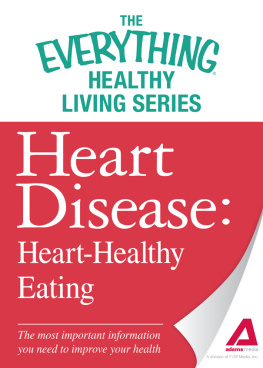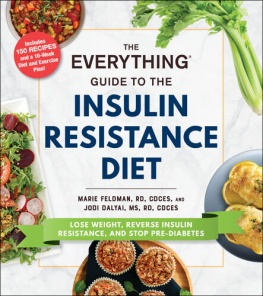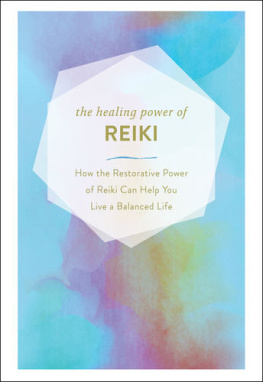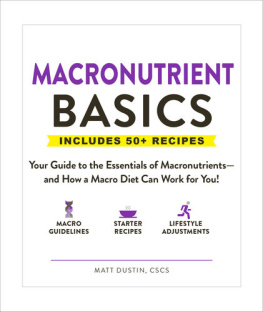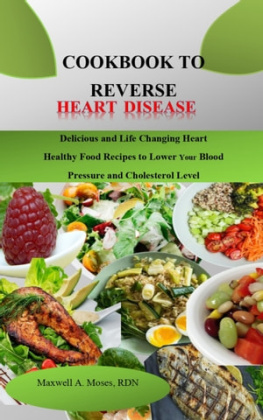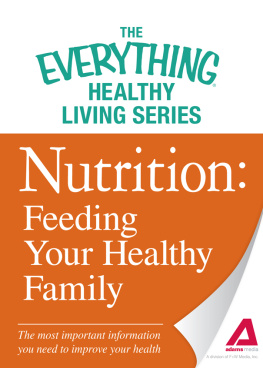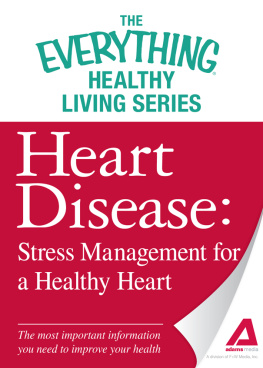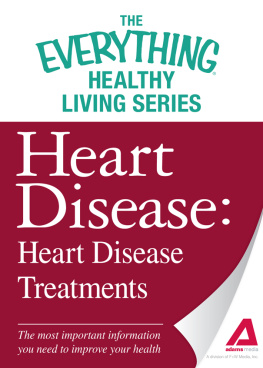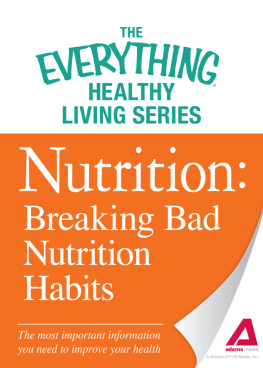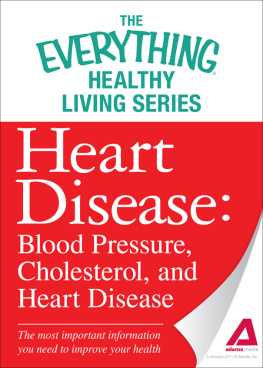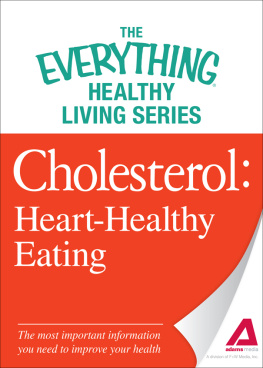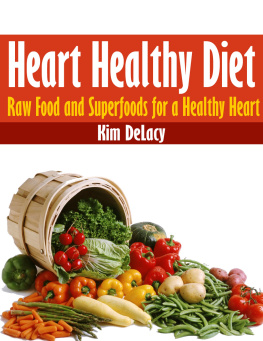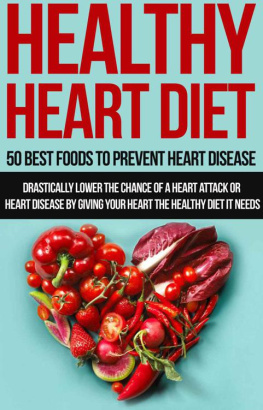Adams Media, an imprint of Simon & Schuster, Inc.
For more than 10 years, millions of readers have trusted the bestselling Everything series for expert advice and important information on health topics ranging from pregnancy and postpartum care to heart health, anxiety, and diabetes. Packed with the most recent, up-to-date data, Everything health guides help you get the right diagnosis, choose the best doctor, and find the treatment options that work for you.
The Everything Healthy Living Series books are concise guides, focusing on only the essential information you need. Whether youre looking for an overview of traditional and alternative migraine treatments, advice on starting a heart-healthy lifestyle, or suggestions for finding the right medical team, theres an Everything Healthy Living Book for you.
Heart Disease
You may have heard of heart disease. Every day it seems a new article comes out about what heart disease does or what affects your heart. Not many people, though, know the full story.
Heart disease is known to be associated with heart attacks, strokes, and other cardiovascular diseases. High blood pressure, high cholesterol, and diabetes may put you at risk. By understanding and managing these risk factors, you can avoid premature death and disability.
Having these risk factors causes buildup in your arteries, the blood vessels that deliver oxygen and nutrients to your brain. When these arteries get too clogged, parts of your organs cannot receive what cells need to survive. If this happens in the blood vessels to the heart, you may develop a heart attack. If this happens in the blood vessels to your brain, you would suffer a stroke. These diseases can leave you disabled, paralyzed, or even kill you.
What you might not know is that you can modify your risk factors and decrease the chance that you will ever develop heart disease. If you know how to lower the bad type of cholesterol and increase the good type, you can significantly prevent clogging or even unclog your arteries, reducing your chance of suffering heart attacks and strokes.
To start to manage your risk factors, you need to get tested beginning at a fairly young age. These tests require repeating every few years, and if you are higher risk, you may need testing more often to determine the proper treatment. This knowledge will help to guide you as you implement changes in your life to improve what puts you at risk.
Heart disease can be greatly influenced by your diet, physical activity, if you smoke, your weight, and your levels of stress. By making certain changes in these areas, you can reduce your chance of early death and disability. Simple changes, such as eating fewer calories and bad fats in exchange for more fiber, nutrients, and good fats, can tremendously influence your risk of heart disease. Even a modest amount of physical activity a few days a week, no matter what the activity, can have a huge impact. Not smoking and reducing stress can also make a significant impact on your risk.
These changes work by modifying many risk factors at once, such as lowering your blood pressure, cholesterol, and blood sugar. Also, such changes in your lifestyle will give you more energy and an improved mood, improving the quality of your life.
Over the past twenty years, significant progress has been made in developing medications that address diabetes, high blood pressure, and high cholesterol and reduce the chance of cardiovascular disease. These medications can create negative side effects, but the benefits may outweigh the risks.
Overall, by understanding heart disease, how it acts, what you can do to manage it, and how to implement those actions, you can influence your future health tremendously, while potentially improving your current life.
If youd like to learn more about heart disease, check out The Everything Guide to Preventing Heart Disease , available in print (978-1-4405-2820-0) and eBook (978-1-4405-2888-0) formats.
Strategies for Heart-Healthy Eating
Knowing what foods are good for you is only half the story; figuring out how to eat them regularly is the challenging part. Changing your routine is never easy, but you can do it if you keep taking small, steady steps. Once you start feeling the benefits of enjoying more fresh, wholesome foods, your new habits will become self-reinforcing. Enjoy the process as you travel toward a healthier you.
Eat Healthful Plant-Based Foods
A nutritious diet is key to creating long-term health. Poor nutrition is one of the leading causes of heart disease. The old adage You are what you eat is actually quite true. Your body derives its nutrients, its building blocks for cellular repair and growth, and its fuel for all activities directly from the food you consume.
The connection between food and your blood-cholesterol levels is direct and powerful. Overconsumption of saturated fats, trans fats, simple sugars, and cholesterol-rich foods leads to overproduction of LDL cholesterol in the liver and the release of excess amounts of triglycerides into the bloodstream. Saturated fats and cholesterol are present only in animal foods. Trans fats are present only in processed, commercial foods.
When you alter your eating habits to include more plant-based foods and fewer animal-based and processed foods, you take a powerful step toward improving the health of your bloodstream. Studies have shown that nutritional factors alone can reduce LDL by as much as 60 percent in individuals with high levels of cholesterol. This change is far more powerful than the best prescription medications. Another significant difference is that improvements in nutrition do not have the same risk of adverse side effects as taking a long-term prescriptive drug. In fact, the main side effects of eating healthier are more energy, weight loss, a clearer mind, and more radiant skin. Lastly, eating healthier is much more affordable than medications or other more invasive treatments for heart attacks and strokes.
Numerous nutritional studies demonstrate that plant-based foods enhance your health, particularly cardiovascular health. Humans cannot exist without plant foods. While it is possible to live healthfully over a lifetime without any consumption of meat, it is not possible to survive without eating plant-based foods.
Moving Away from Meats and Animal Fats
Although researchers have determined that a varied diet of whole fresh foods is the most beneficial to health, you can still enjoy meat as part of a heart-healthy diet; you just need to use it carefully. What you need to focus on is creating dishes from lean cuts of meats and enjoying meats as more of a side dish than a main course. Purchase meats from animals fed grass diets, also called free range, rather than animal fats and animal by-products.
If you eat a typical fast-food diet, it is challenging to convert to a diet of whole fresh foods. What you eat affects your life in a very intimate way. You need to be able to enjoy your meals and snacks and not feel deprived or punished. Take the time that you need to incorporate healthier foods that you enjoy in order to create lasting changes.

